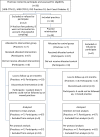Supporting care for suboptimally controlled type 2 diabetes mellitus in general practice with a clinical decision support system: a mixed methods pilot cluster randomised trial
- PMID: 32051304
- PMCID: PMC7045235
- DOI: 10.1136/bmjopen-2019-032594
Supporting care for suboptimally controlled type 2 diabetes mellitus in general practice with a clinical decision support system: a mixed methods pilot cluster randomised trial
Abstract
Objectives: We developed a complex intervention called DECIDE (ComputeriseD dECisIonal support for suboptimally controlleD typE 2 Diabetes mellitus in Irish General Practice) which used a clinical decision support system to address clinical inertia and support general practitioner (GP) intensification of treatment for adults with suboptimally controlled type2 diabetes mellitus (T2DM). The current study explored the feasibility and potential impact of DECIDE.
Design: A pilot cluster randomised controlled trial.
Setting: Conducted in 14 practices in Irish General Practice.
Participants: The DECIDE intervention was targeted at GPs. They applied DECIDE to patients with suboptimally controlled T2DM, defined as a glycated haemoglobin (HbA1c) ≥70 mmol/mol and/or blood pressure ≥150/95 mmHg.
Intervention: The intervention incorporated training and a web-based clinical decision support system which supported; (i) medication intensification actions; and (ii) non-pharmacological actions to support care. Control practices delivered usual care.
Primary and secondary outcome measures: Feasibility and acceptability was determined using thematic analysis of semi-structured interviews with GPs, combined with data from the DECIDE website. Clinical outcomes included HbA1c, medication intensification, blood pressure and lipids.
Results: We recruited 14 practices and 134 patients. At 4-month follow-up, all practices and 114 patients were followed up. GPs reported finding decision support helpful navigating increasingly complex medication algorithms. However, the majority of GPs believed that the target patient group had poor engagement with GP and hospital services for a range of reasons. At follow-up, there was no difference in glycaemic control (-3.6 mmol/mol (95% CI -11.2 to 4.0)) between intervention and control groups or in secondary outcomes including, blood pressure, total cholesterol, medication intensification or utilisation of services. Continuation criteria supported proceeding to a definitive randomised trial with some modifications.
Conclusion: The DECIDE study was feasible and acceptable to GPs but wider impacts on glycaemic and blood pressure control need to be considered for this patient population going forward.
Trial registration number: ISRCTN69498919.
Keywords: diabetes & endocrinology; epidemiology; primary care; quality in health care.
© Author(s) (or their employer(s)) 2020. Re-use permitted under CC BY-NC. No commercial re-use. See rights and permissions. Published by BMJ.
Conflict of interest statement
Competing interests: None declared.
Figures
References
-
- Nolan JJ, O'Halloran D, McKenna TJ, et al. . The cost of treating type 2 diabetes (CODEIRE). Ir Med J 2006;99:307–10. - PubMed
Publication types
MeSH terms
Associated data
LinkOut - more resources
Full Text Sources
Medical

